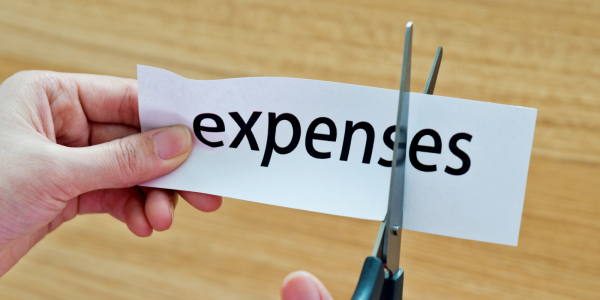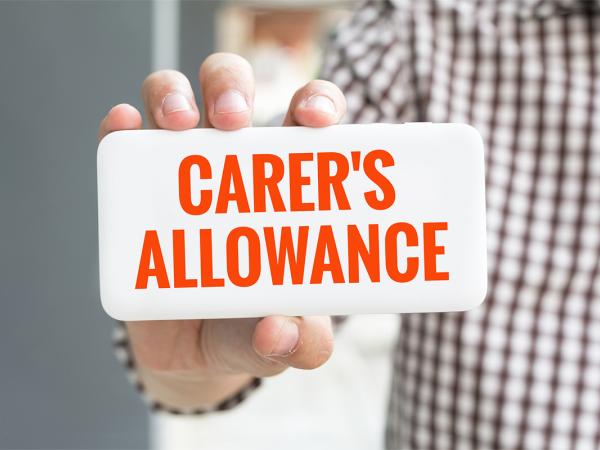When is an expense not an expense?
Carer’s allowance has featured heavily in news over the last few weeks – in particular, reports of carer’s allowance being clawed back due to breaches of the earnings limit threshold. There are several reasons why the earnings limit threshold may appear to be exceeded, but in this blog we explore one issue that can potentially lead to an overpayment of carer’s allowance – carers claiming deductions from income for expenses that they think qualify, but don’t.

Background
Carer's allowance is a non-contributory, non-means-tested benefit paid to people who care at least 35 hours a week for someone who is severely disabled and in receipt of certain disability benefits. In 2024/25, carer’s allowance is £81.90 a week.
One of the conditions for receiving carer’s allowance is that you must not earn more than £151 a week. This £151 figure is for 2024/25 – and there are some averaging rules for those not paid weekly. This includes money from employment and self-employment, for example, if you have a part-time job. If you go over the weekly limit by even a few pennies or pounds but have continued to receive the allowance, the entire weekly amount is treated as an overpayment and clawed back. This is known as a ‘cliff-edge’.
The House of Commons Work and Pensions Committee explored problems with overpayments of carer’s allowance in their 2019 report with the hope that new systems would be more effective in preventing overpayments. However, recent figures suggest more than 156,000 unpaid carers are currently facing overpayments and, in some instances, penalties or prosecution on top (although not all of these will be down to issues with the earnings limit).
Why do people breach the earnings limit?
The £151 amount is counted per week after deductions for tax, National Insurance and certain expenses. It is equivalent to just about 13 hours at the minimum wage. Carers say mistakes with the earnings limit are easily made unwittingly. For example, taking on a few extra hours over Christmas or the annual minimum wage uprating or getting a small bonus can mean income exceeds the threshold. Many are also paid monthly or irregularly, making it harder for them to work out their weekly income.
We also think that it is possible that the incorrect claiming of expenses as a deduction from income is a contributory issue. Some reasons why we think this are outlined below.
Queries to our website
Queries we have received, like the following, indicate confusion over expenses:
‘Hello, I'm wondering whether I would qualify for carers allowance but I am unsure on what the expense are. Does food shopping and electricity, gas, rent, council tax also count as expense? It's very vague on what qualifies’
‘Can I use my fuel costs to and from work as an expense for my carers allowance?’
‘For several months while claiming CA, I was employed as a care assistant visiting clients in their homes, using my own car. Employer was only reimbursing me 10p per mile but the CA Unit would not allow an additional 35p deduction’
Reports seen in the media
For example, in one case, it was reported that DWP disallowed an expense deduction for a work laptop, pushing the carer over the earnings limit
National Audit Office (NAO) report
The NAO concluded in their 2019 report that ‘uncertainty about what are allowable expenses can also lead to overpayments. The Department is reviewing its initial and annual letters to carers, as well as the online guidance, to clarify carers’ obligations’.
HMRC v DWP rules
A commonly-held view around expenses for carer’s allowance is that you can deduct expenses in exactly the same way that you can for income tax purposes – making the tax treatment the reference point. Typically (even if it is possibly unfair) the tax treatment can be discerned – and if not by the claimant, then by the carer’s allowance unit. One would like to think that the carer’s allowance unit are joined up with HMRC, such that any technical queries can be resolved. So what is the problem here?
Well, let’s look at how expenses might be treated by DWP in comparison to HMRC. For those with a technical interest, the relevant DWP legislation can be found on the government’s legislation website (see regulations 9 and 13). The Decision Makers Guide then interprets this law into a guidance manual for DWP staff members to refer to when making decisions.
Employed expense treatment
From the DWP Decision Makers Guidance (15380) we can see that expenses not reimbursed by an employer can be deducted from gross earnings to arrive at net earnings, which you then measure against the £151 amount. DWP Decision Makers Guidance (15387) reiterates that, to count, the expense must be wholly, exclusively and necessarily incurred in the performance of the duties of the employment. So we start in the same place as tax law (s336 ITEPA 2003).
The DWP Decision Makers Guidance (15388/15389) lists different allowable expenses – all of which are familiar – and also talks of looking, when considering any private use proportion, to see what HMRC may or may not have done in terms of their treatment. So far so good in terms of the DWP and HMRC being on the same page!
However, it then becomes less clear. For example, tax law has some specific ‘extra’ allowable deduction provisions, such as for professional subscriptions, which are not replicated by DWP. In the list of qualifying items in 15388, it lists ‘travelling costs between different workplaces and any accommodation costs involved’ but it does not go so far as to say what amounts to use when calculating mileage deductions. Is it on an actual cost basis? Can you use HMRC’s mileage allowance system to calculate the deductible amount? Is it, as suggested by the query above to our website, something else entirely? Or even maybe a little bit of all of these?
In terms of ‘equipment’, while there is not a capital/revenue distinction in s336 ITEPA 2003, HMRC say that that it would be rare for equipment that someone buys to do their job to be allowed under s336. This is because usually such expenditure puts the person in the position to perform their duties, and is not incurred in the performance of duties. However, HMRC also say that capital allowances might be due instead for depreciation related to business use of equipment, as the restrictions/rules for capital allowances are slightly different. In addition, they give a number of specific examples, including in relation to computers in their guidance.
The mechanism for such capital allowances relief is via the Annual Investment Allowance (AIA), which gives a 100% deduction in the first year, so the effect is the same as a ‘normal’ expense deduction. In addition, HMRC say that a claim for capital allowances can be made on form P87 – tax relief for expenses of employment – where someone is not in self-assessment.
So, here is another potential trap – in the current labour market, it is no longer a given that employers will always provide key equipment. People claiming carer’s allowance may occasionally need to purchase something like a laptop for their work even where they are employed. This may look and feel like a s336 type expense (even though relief is technically given under a different provision in tax law) but in reality, the scope of allowable deductions for carer’s allowance doesn’t appear to quite stretch to capital allowances.
Self-employed expense treatment
When calculating the earnings of a self-employed earner, the DWP Decision Makers Guidance (15532) tells us to take gross receipts less allowable expenses. Per 15580, the first test for working out if expenses are allowable is that they were paid wholly and exclusively for the purposes of the business. This will be recognisable to anyone in the tax world as being the rule for revenue-style expenses – or the rule for both revenue and most capital expenses, under the cash basis.
But this is where similarities end and problems can begin….
Some carers will find that being self-employed is a good way of working, as it allows them to manage their own time and often means they can work from home. Purchases like a laptop for their self-employed work are probably quite common. Indeed, one of the cases highlighted by the media (linked to above) was of this very same scenario. In tax law, one would think that a work laptop would count as a deduction – or perhaps a portion of the cost would count, if there was significant private use. So what happened here? Well without seeing the actual details of the case, we don’t know exactly, but working through the rules could produce something like this:
A laptop will be considered a capital expense for tax purposes. However, small scale self-employed businesses will often use the cash basis for their accounts and so will simply deduct the cost of a laptop in calculating income for tax purposes. Even if they are not using the cash basis, AIA capital allowances can be claimed instead which effectively achieves the same result.
By contrast, DWP specifically state that they do not allow capital expenditure is specifically not allowed as a self-employed business expense (see the Decision Makers Guidance 15621). Even if you could argue that the equipment is a ‘day to day’ expense rather than a capital expense, there is a 'reasonably incurred' clause limiting what expenses you can deduct (see 15580 and 15586 to 15589), which DWP say means ‘appropriate to the business, necessary and not excessive’.
So if a carer bought a laptop that was a particularly expensive model, under this rule, the DWP could deny the deduction if they think they could have bought a cheaper one to meet the business needs. This does not exist in tax law, where provided the expense meets the wholly and exclusively test, the amount of money involved does not matter.
In addition, what do DWP treat as capital expenditure? Some small, inexpensive tools of a tradesman for instance that have to be fairly frequently replaced would probably regard by HMRC as revenue in nature. More substantial, longer-life items of equipment (for example, lawn mowers for gardeners, ladders for a roofer, or even a van) are more likely be capital in HMRC’s view. Do DWP appreciate this distinction? In reality, there is no way to be sure whether any of these items would fall to be revenue or capital expenditure because DWP guidance does not give any further information.
It is all undoubtedly problematic. In particular, the ‘reasonableness test’ which, although inserted presumably to protect the public purse, adds a whole layer of confusion and uncertainty for carers, as it appears to allow an individual DWP officer to make a judgement call on what is reasonable in any given case.
Even more confusion
If you look at the GOV.UK guidance on carer’s allowance, the following wording appears:
‘Your earnings are any income from employment and self-employment after tax, National Insurance and expenses. Expenses can include… business costs if you’re self-employed, for example a computer you only use for work’.
This suggests the DWP think of this is a revenue expense even though HMRC would likely treat it as a capital expense and DWP legislation says capital expenses cannot be deducted!
Confused? Yes, us too.
A better system
Taking all of the above together, the confusing situation highlighted by the NAO in 2019 around what expenses are allowable appears to continue to exist – both at claimant level and DWP decision maker level.
Divergence and misalignment between the tax and benefits are all too common. For example, did you know that the trading allowance applies for tax credits but not for universal credit? And see our commentary on the differences in definitions around employment status, and our report highlighting the burdens for self-employed people in universal credit around how and when to report income. However, this carer’s allowance situation is particularly stark because of the cliff-edge that exists from the earnings limit.
Some organisations such as Carers UK are already making eminently sensible ‘asks’ in this area. We would like to add something to the list:
We appreciate that HMRC and DWP are trying to achieve different things, and there are different policy drivers behind different approaches. But, ideally, the expense rules could be better aligned between the two departments, such that DWP would need a very good reason to stray from whatever HMRC do (or vice versa). At the very least, we think more could be done to highlight and clarify such points of divergence between tax law and DWP like this, which might help to avoid overpayments and the consequent distress and hardship they cause.
A final note for claimants
If you are facing an overpayment situation, we hope that this blog provides some insight on the ability to claim deductions of certain expenses to reduce the amount of income reckoned in the carer’s allowance calculation. We have further information on some of the other deductions you may be able to claim in our guidance. However, as this blog shows, this is a complex area and the best course of action is to speak to a welfare rights adviser as to how the rules to apply to your situation.
Furthermore if you have received an overpayment letter, and it is to do with expenses which you have already claimed, make sure you:
- have all the details of the sums that are allegedly overpaid,
- are clear on the basis the deduction is being denied, and
- have gathered any information you can about the tax treatment in case this is important.
If you wish to challenge the decision, then you will need to use the appeal process. The first stage in the appeals process is to request a mandatory reconsideration (MR). Once DWP have completed the MR, they will let you know the outcome and if you disagree, you will then be able to appeal to the independent tribunal. We recommend seeking advice from a welfare rights adviser for this as the appeal process has strict deadlines and sometimes you may need to formally request that DWP make a formal decision before you can proceed.



